
Concerts

Octavie Dostaler-Lalonde & Postscript
Cello Sensation According to Geminiani
Naples found him too wild, but in London he became a sensation: the rhythmic liberties and unpredictable tempi of composer Francesco Geminiani were, in the early 18th century, a scandalous success throughout Europe.
Young Canadian star cellist Octavie Dostaler-Lalonde throws herself into Geminiani’s sonatas for cello, supported by her Postscript colleagues on theorbo and harpsichord.

Octavie Dostaler-Lalonde & Postscript
Cello Sensation According to Geminiani
Naples found him too wild, but in London he became a sensation: the rhythmic liberties and unpredictable tempi of composer Francesco Geminiani were, in the early 18th century, a scandalous success throughout Europe.
Young Canadian star cellist Octavie Dostaler-Lalonde throws herself into Geminiani’s sonatas for cello, supported by her Postscript colleagues on theorbo and harpsichord.

Octavie Dostaler-Lalonde & Postscript
Cello Sensation According to Geminiani
Naples found him too wild, but in London he became a sensation: the rhythmic liberties and unpredictable tempi of composer Francesco Geminiani were, in the early 18th century, a scandalous success throughout Europe.
Young Canadian star cellist Octavie Dostaler-Lalonde throws herself into Geminiani’s sonatas for cello, supported by her Postscript colleagues on theorbo and harpsichord.

Octavie Dostaler-Lalonde & Postscript
Cello Sensation According to Geminiani
Naples found him too wild, but in London he became a sensation: the rhythmic liberties and unpredictable tempi of composer Francesco Geminiani were, in the early 18th century, a scandalous success throughout Europe.
Young Canadian star cellist Octavie Dostaler-Lalonde throws herself into Geminiani’s sonatas for cello, supported by her Postscript colleagues on theorbo and harpsichord.

Elisabeth Hetherington and Postscript
Be enchanted by the crystal-clear, expressive voice of the wonderful soprano Elisabeth Hetherington (Nederlandse Muziekprijs 2024) in arias from famous Baroque operas.
At this concert by Ensemble Postscript, you will hear some of the most beautiful Baroque music that was popular at the time for performance among friends in private salons.
In addition to the arias, Johann Sebastian Bach’s dazzling Fifth Brandenburg Concerto will be performed — featuring a virtuosic solo role for the harpsichord, played by Ukrainian keyboard virtuoso Artem Belogurov.
Concert with intermission — intermission drink included
Music by, among others: Georg Friedrich Händel, Francesco Geminiani, Johann Adolph Hasse, Battista Bononcini
Johann Sebastian Bach – Brandenburg Concerto No. 5, BWV 1050-2
Elisabeth Hetherington, soprano
Postscript:
Octavie Dostaler-Lalonde, cello
Artem Belogurov, harpsichord
David Westcombe, traverso
Tomoe Badiarova, violin
Chloe Prendergast, violin
Iteke Wijbenga, viola

The Ladies of Bayreuth
Aysha Wills, traverso / David Westcombe, traverso / Octavie Dostaler-Lalonde, cello / Artem Belogurov, harpsichord
Music by Ana Bon di Venezia, Wilhelmina von Bayreuth, Duchess Anna Amalia of Brunswick-Wolfenbüttehl, J.F. Kleinknecht.
This program showcases the extraordinary musical contributions of female composers with strong ties to Bayreuth, featuring notable figures such as Ana Bon di Venezia, Wilhelmina von Bayreuth, Duchess Anna Amalia of Brunswick-Wolfenbüttehl, and the only male composer on the program, J.F. Kleinknecht. Ana Bon di Venezia, an Italian composer, singer, and harpsichordist, emerged as a leading musician in Bayreuth under the patronage of Margravine Wilhelmine. Her prolific output of chamber music, operas, and arias, praised for its beauty and expressiveness, solidified her reputation as one of the foremost female composers of her time. The Margravine's involvement, including commissioning and performing in Bon di Venezia's operas, played a pivotal role in her development. Although Bon di Venezia's later years remain shrouded in mystery, her significant relationship with Bayreuth has recently led to the rediscovery and appreciation of her historically significant and beautifully crafted.
Het Park, Westerdijk 4, 1621LE Hoorn — Kleine Zaal Othello
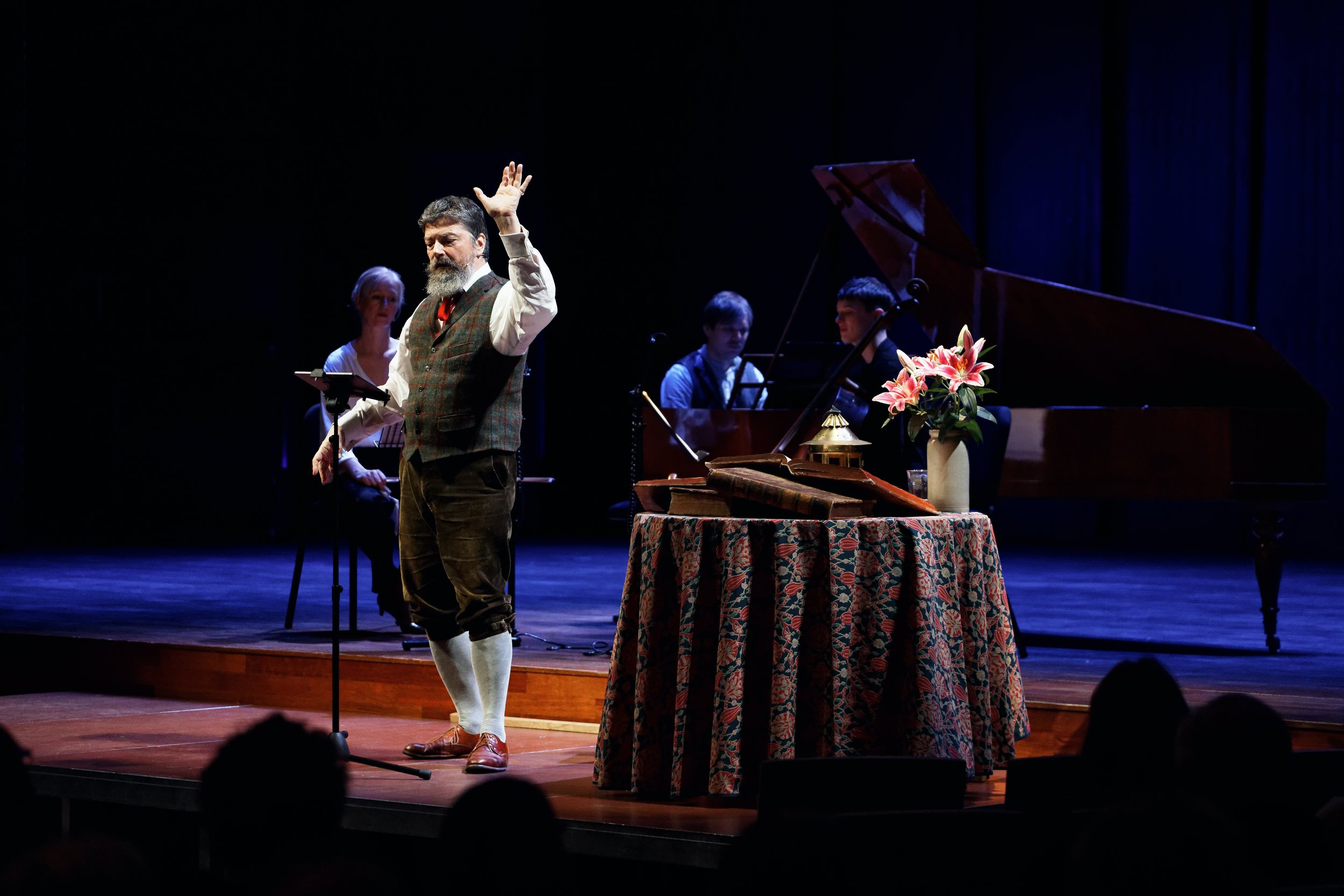
Byron's Manfred — a dramatic reading
Byron’s Manfred – a dramatic reading
with incidental music by Robert and Clara Schumann, and Fanny Hensel-Mendelssohn
Jedidiah Wentz, declamation
Jenna Sherry, violin
Artem Belogurov, fortepiano
Octavie Dostaler-Lalonde, cello
https://www.utrechtslandschap.nl/activiteiten/evenement/toneelstuk-manfred-op-kasteel-loenersloot
Published in 1817, Byron’s Manfred was both a scandal and an overnight sensation. In verses of sublime poetry inspired by Goethe’s Faust, Byron tells the story of a doomed magician defiantly challenging the authority of both God and the devil. With Manfred, he created the model for the romantic anti-hero, the so-called ‘Byronic hero’: a daemonic, brooding and wounded character who causes physical and emotional suffering to everyone around him, while suffering even more greatly himself. Manfred’s magical powers arise from a terrible secret, from some guilty deed in his past, some act too horrible to even be named, and from the irremediable torture his soul endures because of it. No mortal or immortal being can conquer Manfred, for none is as guilty–nor has suffered as much–as he.
Throughout the 19th century, Manfred was performed in Britain and the United States of America as a one-man show. Using elaborate gestures and melodious declamation, a single actor read Byron’s verses, using his voice to create and animate all of the different characters. The intermittent musical accompaniment sometimes interrupted and sometimes coincided with the declamation, creating melodramatic moments of great intensity by uniting and contrasting music with text. Inspired by accounts of this lost performance tradition, the musicians of Postscript and historical actor Jedidiah Wentz have created a new, intimate chamber version of Manfred. The incidental music is made up of pieces by Robert and Clara Schumann interpolated into a revised and shortened version of Byron’s original English text. The score contains music from Robert Schumann’s Manfred: Dramatisches Gedicht in drei Abtheilungen arranged for piano trio, including the best-loved sections such as the Overture, Erscheinung eines Zauberbildes, Zwichenactmusik, Die Alpenfee, and Ansprache an Astarte. To these are added Robert Schumann’s Abendlied, the Fantasie in g minor by Fanny Hensel-Mendelssohn and Clara Schumann’s Romanzen op. 11 no. 2 and op. 22 no. 1, as well as the Scène Fantastique op. 5 no. 4.
Our aim has been to highlight the most emotional scenes of the poem: the audience is invited to empathize with Manfred, to experience his torment at the death of his beloved Astarte, his scornful defiance of the authority of God and the devil, and his conviction that his sorrow, his sin and his guilt are his very essence because they give him his greatest power. To this end, we do not send Manfred to heaven in a last-minute act of divine intervention, as Robert Schumann did in his musical setting. Rather, following Byron’s original, we allow the listener to decide if Manfred has descended into eternal hell-fire, or if he has finally found the oblivion he seeks.
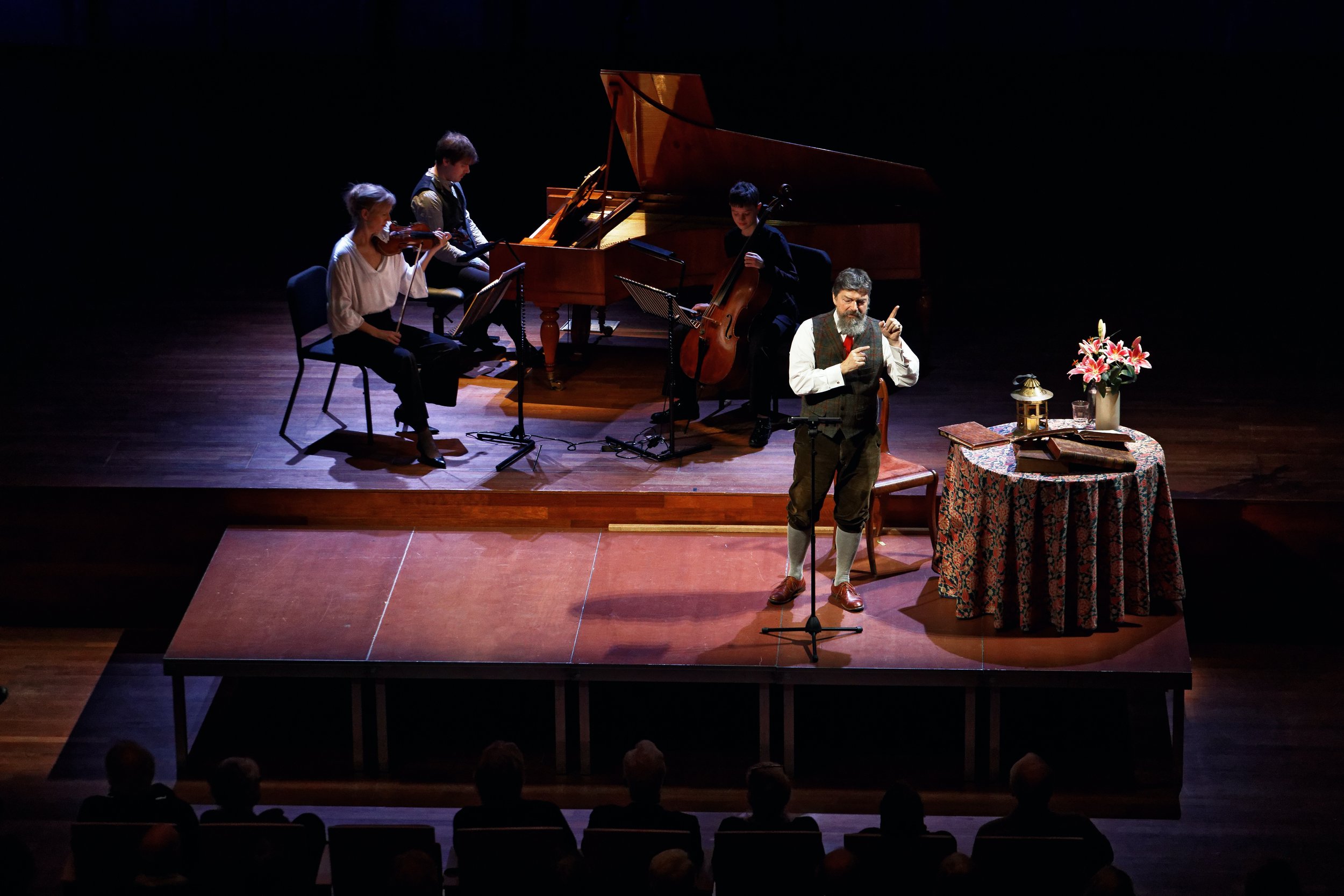
Byron's Manfred — a dramatic reading
Byron’s Manfred – a dramatic reading
with incidental music by Robert and Clara Schumann, and Fanny Hensel-Mendelssohn
Jedidiah Wentz, declamation
Artem Belogurov, fortepiano
Octavie Dostaler-Lalonde, cello
https://www.utrechtslandschap.nl/activiteiten/evenement/toneelstuk-manfred-op-kasteel-loenersloot
Published in 1817, Byron’s Manfred was both a scandal and an overnight sensation. In verses of sublime poetry inspired by Goethe’s Faust, Byron tells the story of a doomed magician defiantly challenging the authority of both God and the devil. With Manfred, he created the model for the romantic anti-hero, the so-called ‘Byronic hero’: a daemonic, brooding and wounded character who causes physical and emotional suffering to everyone around him, while suffering even more greatly himself. Manfred’s magical powers arise from a terrible secret, from some guilty deed in his past, some act too horrible to even be named, and from the irremediable torture his soul endures because of it. No mortal or immortal being can conquer Manfred, for none is as guilty–nor has suffered as much–as he.
Throughout the 19th century, Manfred was performed in Britain and the United States of America as a one-man show. Using elaborate gestures and melodious declamation, a single actor read Byron’s verses, using his voice to create and animate all of the different characters. The intermittent musical accompaniment sometimes interrupted and sometimes coincided with the declamation, creating melodramatic moments of great intensity by uniting and contrasting music with text. Inspired by accounts of this lost performance tradition, the musicians of Postscript and historical actor Jedidiah Wentz have created a new, intimate chamber version of Manfred. The incidental music is made up of pieces by Robert and Clara Schumann interpolated into a revised and shortened version of Byron’s original English text. The score contains music from Robert Schumann’s Manfred: Dramatisches Gedicht in drei Abtheilungen arranged for piano trio, including the best-loved sections such as the Overture, Erscheinung eines Zauberbildes, Zwichenactmusik, Die Alpenfee, and Ansprache an Astarte. To these are added Robert Schumann’s Abendlied, the Fantasie in g minor by Fanny Hensel-Mendelssohn and Clara Schumann’s Romanzen op. 11 no. 2 and op. 22 no. 1, as well as the Scène Fantastique op. 5 no. 4.
Our aim has been to highlight the most emotional scenes of the poem: the audience is invited to empathize with Manfred, to experience his torment at the death of his beloved Astarte, his scornful defiance of the authority of God and the devil, and his conviction that his sorrow, his sin and his guilt are his very essence because they give him his greatest power. To this end, we do not send Manfred to heaven in a last-minute act of divine intervention, as Robert Schumann did in his musical setting. Rather, following Byron’s original, we allow the listener to decide if Manfred has descended into eternal hell-fire, or if he has finally found the oblivion he seeks.

OverActing: Scenes from Byron’s Manfred, A Gothic Entertainment
OverActing: Scenes from Byron’s Manfred, A Gothic Entertainment
with incidental music by Robert and Clara Schumann, and Fanny Hensel-Mendelssohn
This performance, lecture, and Q&A are part of OverActing Festival
18:00-18:45 Lecture by Jed Wentz: Historical declamation, the actor’s craft and its relationship with musical performance practice
19:00-20:30 Performance spoken word and music — Scenes from Byron’s Manfred, A Gothic Entertainment
In partnership with Eye Filmmuseum Collections
Jedidiah Wentz declamation
Cecilia Bernardini violin
Artem Belogurov fortepiano
Octavie Dostaler-Lalonde cello
20:30-21:00 Q & A
Published in 1817, Byron’s Manfred was both a scandal and an overnight sensation. In verses of sublime poetry inspired by Goethe’s Faust, Byron tells the story of a doomed magician defiantly challenging the authority of both God and the devil. With Manfred, he created the model for the romantic anti-hero, the so-called ‘Byronic hero’: a daemonic, brooding and wounded character who causes physical and emotional suffering to everyone around him, while suffering even more greatly himself. Manfred’s magical powers arise from a terrible secret, from some guilty deed in his past, some act too horrible to even be named, and from the irremediable torture his soul endures because of it. No mortal or immortal being can conquer Manfred, for none is as guilty–nor has suffered as much–as he.
Throughout the 19th century, Manfred was performed in Britain and the United States of America as a one-man show. Using elaborate gestures and melodious declamation, a single actor read Byron’s verses, using his voice to create and animate all of the different characters. The intermittent musical accompaniment sometimes interrupted and sometimes coincided with the declamation, creating melodramatic moments of great intensity by uniting and contrasting music with text. Inspired by accounts of this lost performance tradition, the musicians of Postscript and historical actor Jedidiah Wentz have created a new, intimate chamber version of Manfred. The incidental music is made up of pieces by Robert and Clara Schumann interpolated into a revised and shortened version of Byron’s original English text. The score contains music from Robert Schumann’s Manfred: Dramatisches Gedicht in drei Abtheilungen arranged for piano trio, including the best-loved sections such as the Overture, Erscheinung eines Zauberbildes, Zwichenactmusik, Die Alpenfee, and Ansprache an Astarte. To these are added Robert Schumann’s Abendlied, the Fantasie in g minor by Fanny Hensel-Mendelssohn and Clara Schumann’s Romanzen op. 11 no. 2 and op. 22 no. 1, as well as the Scène Fantastique op. 5 no. 4.
Our aim has been to highlight the most emotional scenes of the poem: the audience is invited to empathize with Manfred, to experience his torment at the death of his beloved Astarte, his scornful defiance of the authority of God and the devil, and his conviction that his sorrow, his sin and his guilt are his very essence because they give him his greatest power. To this end, we do not send Manfred to heaven in a last-minute act of divine intervention, as Robert Schumann did in his musical setting. Rather, following Byron’s original, we allow the listener to decide if Manfred has descended into eternal hell-fire, or if he has finally found the oblivion he seeks.
What is OverActing?
The Overacting Festival 2024 is a continuation of our first OverActing festival, which took place in Leiden in 2022. This first edition was a collaboration between Festival Oude Muziek Utrecht, Universiteit Leiden and the Leidse Schouwburg in celebration of Leiden European City of Science. We at the Academy of Creative and Performing Arts now take up the gauntlet once more, to present a weekend of events related to acting styles and the expression of emotion on stage and in film, in celebration of the communicative power of the performing arts.
The 2024 OverActing festival will be on a much smaller scale than its predecessor, and is financed and ‘powered’ solely by The Academy of Creative and Performing Arts, but will combine, like its predecessor, performance and scholarship in a unique manner. Our aim is not only to programme high quality and thought-provoking performances in Leiden and Den Haag, but also an international academic symposium, that can serve as a think tank for future festival programming. In this way, the performers and scholars of theatre and acting practices can stay in touch with each other’s contributions to the field, thus stimulating discussion and experimentation.
We will also reach out to the audience in Leiden and The Hague through workshops and lectures with a special emphasis on students to the Koninklijk Conservatorium and Leiden University.
The motivation behind OverActing is both artistic and social: we aim to revitalize our current arts practice by learning from the past, while we put both the research methodologies and the resulting techniques at the service of artists who wish to address topics they find relevant today. Our aim is not nostalgia, but destabilization as a source of renewed artistic practices. Thus the 2024 OverActing festival will address questions of methodology through a workshop, and a lecture-performance at the Koninklijk Coservatorium Den Haag; moreover, it aims to support the LGBTQ+ community by presenting works by Lord Byron (1788-1824) and F. W. Murnau (1888-1931). This year is the bicentenary of Byron’s death, who was well-known for his bisexuality during his life time. F. W. Murnau was openly homosexual. His film Der letzte Mann, which is 100 years old this year, ends, quite daringly, with a gay wedding.

Byron's Manfred — a dramatic reading
Byron’s Manfred – a dramatic reading
with incidental music by Robert and Clara Schumann, and Fanny Hensel-Mendelssohn
Jedidiah Wentz, declamation
Cecilia Bernardini, violin
Artem Belogurov, fortepiano
Octavie Dostaler-Lalonde, cello
https://www.utrechtslandschap.nl/activiteiten/evenement/toneelstuk-manfred-op-kasteel-loenersloot
Published in 1817, Byron’s Manfred was both a scandal and an overnight sensation. In verses of sublime poetry inspired by Goethe’s Faust, Byron tells the story of a doomed magician defiantly challenging the authority of both God and the devil. With Manfred, he created the model for the romantic anti-hero, the so-called ‘Byronic hero’: a daemonic, brooding and wounded character who causes physical and emotional suffering to everyone around him, while suffering even more greatly himself. Manfred’s magical powers arise from a terrible secret, from some guilty deed in his past, some act too horrible to even be named, and from the irremediable torture his soul endures because of it. No mortal or immortal being can conquer Manfred, for none is as guilty–nor has suffered as much–as he.
Throughout the 19th century, Manfred was performed in Britain and the United States of America as a one-man show. Using elaborate gestures and melodious declamation, a single actor read Byron’s verses, using his voice to create and animate all of the different characters. The intermittent musical accompaniment sometimes interrupted and sometimes coincided with the declamation, creating melodramatic moments of great intensity by uniting and contrasting music with text. Inspired by accounts of this lost performance tradition, the musicians of Postscript and historical actor Jedidiah Wentz have created a new, intimate chamber version of Manfred. The incidental music is made up of pieces by Robert and Clara Schumann interpolated into a revised and shortened version of Byron’s original English text. The score contains music from Robert Schumann’s Manfred: Dramatisches Gedicht in drei Abtheilungen arranged for piano trio, including the best-loved sections such as the Overture, Erscheinung eines Zauberbildes, Zwichenactmusik, Die Alpenfee, and Ansprache an Astarte. To these are added Robert Schumann’s Abendlied, the Fantasie in g minor by Fanny Hensel-Mendelssohn and Clara Schumann’s Romanzen op. 11 no. 2 and op. 22 no. 1, as well as the Scène Fantastique op. 5 no. 4.
Our aim has been to highlight the most emotional scenes of the poem: the audience is invited to empathize with Manfred, to experience his torment at the death of his beloved Astarte, his scornful defiance of the authority of God and the devil, and his conviction that his sorrow, his sin and his guilt are his very essence because they give him his greatest power. To this end, we do not send Manfred to heaven in a last-minute act of divine intervention, as Robert Schumann did in his musical setting. Rather, following Byron’s original, we allow the listener to decide if Manfred has descended into eternal hell-fire, or if he has finally found the oblivion he seeks.
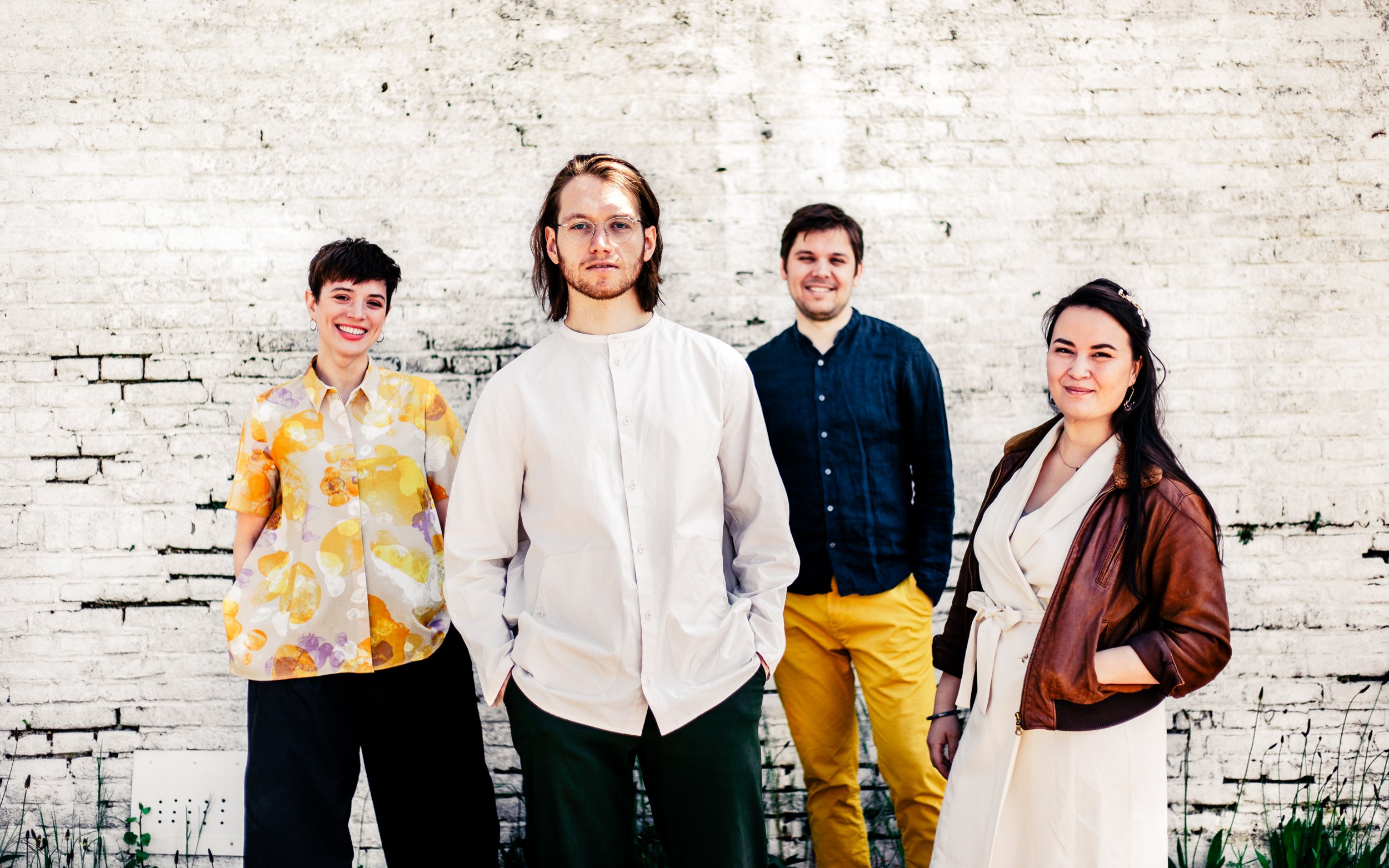
Four Temperaments
Kloster Neuzelle
David Westcombe, traverso
Aysha Wills, traverso
Octavie Dostaler-Lalonde, cello
Artem Belogurov, harpsichord
https://www.klosterneuzelle.de/#page-53-box
Music by J. S. Bach, W. F. Bach, G. F. Händel, G. P. Telemann, J. F. Kleinknecht
The idea that music influences our emotions has existed for centuries. In the 17th and 18th centuries, German theorists codified how composers could convey emotional states to their audiences. The Theory of Affects, or Affektenlehre, described how music could arouse passions in listeners, such as joy or sadness.
During the Baroque era, composers gradually shifted from using music to passively describe emotions to using it as a tool to arouse those emotions in the listener. This shift is exemplified by the style of Empfindsamkeit, which emphasized direct emotional experience.
The Theory of Affects also considered the variability of reactions on the part of listeners. The four temperaments - phlegmatic, choleric, melancholic, and sanguine - were thought to influence how people responded to music. For example, a melancholic person would be more likely to weep when the music represents sorrow, while a sanguine person would be less likely to do so.
For us, four musicians with distinct musical personalities, exploring the Theory of Affects was a fascinating way to understand how music affects the audience and how each of us relates to the four temperaments.

Four Temperaments
Kapellenkonzerte Chorin
David Westcombe, traverso
Aysha Wills, traverso
Octavie Dostaler-Lalonde, cello
Artem Belogurov, harpsichord
https://chorintop3.ticketfritz.de/Event/Kalender/17329/39686?typ=Vorlage
Music by J. S. Bach, W. F. Bach, G. F. Händel, G. P. Telemann, J. F. Kleinknecht
The idea that music influences our emotions has existed for centuries. In the 17th and 18th centuries, German theorists codified how composers could convey emotional states to their audiences. The Theory of Affects, or Affektenlehre, described how music could arouse passions in listeners, such as joy or sadness.
During the Baroque era, composers gradually shifted from using music to passively describe emotions to using it as a tool to arouse those emotions in the listener. This shift is exemplified by the style of Empfindsamkeit, which emphasized direct emotional experience.
The Theory of Affects also considered the variability of reactions on the part of listeners. The four temperaments - phlegmatic, choleric, melancholic, and sanguine - were thought to influence how people responded to music. For example, a melancholic person would be more likely to weep when the music represents sorrow, while a sanguine person would be less likely to do so.
For us, four musicians with distinct musical personalities, exploring the Theory of Affects was a fascinating way to understand how music affects the audience and how each of us relates to the four temperaments.

Byron's Manfred — a dramatic reading
Byron’s Manfred – a dramatic reading
with incidental music by Robert and Clara Schumann, and Fanny Hensel-Mendelssohn
Jedidiah Wentz, declamation
Cecilia Bernardini, violin
Artem Belogurov, fortepiano
Octavie Dostaler-Lalonde, cello
Aanvang: 15:00 uur | Zaal open: 14:30 uur
Entree: € 25.00 | Student en t/m 21 jaar: € 12.50
https://huismidwoud.nl/concertagenda/
Reservations: info@huismidwoud.nl
Published in 1817, Byron’s Manfred was both a scandal and an overnight sensation. In verses of sublime poetry inspired by Goethe’s Faust, Byron tells the story of a doomed magician defiantly challenging the authority of both God and the devil. With Manfred, he created the model for the romantic anti-hero, the so-called ‘Byronic hero’: a daemonic, brooding and wounded character who causes physical and emotional suffering to everyone around him, while suffering even more greatly himself. Manfred’s magical powers arise from a terrible secret, from some guilty deed in his past, some act too horrible to even be named, and from the irremediable torture his soul endures because of it. No mortal or immortal being can conquer Manfred, for none is as guilty–nor has suffered as much–as he.
Throughout the 19th century, Manfred was performed in Britain and the United States of America as a one-man show. Using elaborate gestures and melodious declamation, a single actor read Byron’s verses, using his voice to create and animate all of the different characters. The intermittent musical accompaniment sometimes interrupted and sometimes coincided with the declamation, creating melodramatic moments of great intensity by uniting and contrasting music with text. Inspired by accounts of this lost performance tradition, the musicians of Postscript and historical actor Jedidiah Wentz have created a new, intimate chamber version of Manfred. The incidental music is made up of pieces by Robert and Clara Schumann interpolated into a revised and shortened version of Byron’s original English text. The score contains music from Robert Schumann’s Manfred: Dramatisches Gedicht in drei Abtheilungen arranged for piano trio, including the best-loved sections such as the Overture, Erscheinung eines Zauberbildes, Zwichenactmusik, Die Alpenfee, and Ansprache an Astarte. To these are added Robert Schumann’s Abendlied, the Fantasie in g minor by Fanny Hensel-Mendelssohn and Clara Schumann’s Romanzen op. 11 no. 2 and op. 22 no. 1, as well as the Scène Fantastique op. 5 no. 4.
Our aim has been to highlight the most emotional scenes of the poem: the audience is invited to empathize with Manfred, to experience his torment at the death of his beloved Astarte, his scornful defiance of the authority of God and the devil, and his conviction that his sorrow, his sin and his guilt are his very essence because they give him his greatest power. To this end, we do not send Manfred to heaven in a last-minute act of divine intervention, as Robert Schumann did in his musical setting. Rather, following Byron’s original, we allow the listener to decide if Manfred has descended into eternal hell-fire, or if he has finally found the oblivion he seeks.

CANCELED. Byron's Manfred — a dramatic reading
Byron’s Manfred – a dramatic reading
with incidental music by Robert and Clara Schumann, and Fanny Hensel-Mendelssohn
Jedidiah Wentz, declamation
Cecilia Bernardini, violin
Artem Belogurov, fortepiano
Octavie Dostaler-Lalonde, cello
Standaard €18.00
Museumkaart, stadspas, Lutheranen €15.00
Standaard studenten/ CJP / jongeren <18 jr €5.00
https://luthermuseum.nl/nl/agenda/manfred-project
Published in 1817, Byron’s Manfred was both a scandal and an overnight sensation. In verses of sublime poetry inspired by Goethe’s Faust, Byron tells the story of a doomed magician defiantly challenging the authority of both God and the devil. With Manfred, he created the model for the romantic anti-hero, the so-called ‘Byronic hero’: a daemonic, brooding and wounded character who causes physical and emotional suffering to everyone around him, while suffering even more greatly himself. Manfred’s magical powers arise from a terrible secret, from some guilty deed in his past, some act too horrible to even be named, and from the irremediable torture his soul endures because of it. No mortal or immortal being can conquer Manfred, for none is as guilty–nor has suffered as much–as he.
Throughout the 19th century, Manfred was performed in Britain and the United States of America as a one-man show. Using elaborate gestures and melodious declamation, a single actor read Byron’s verses, using his voice to create and animate all of the different characters. The intermittent musical accompaniment sometimes interrupted and sometimes coincided with the declamation, creating melodramatic moments of great intensity by uniting and contrasting music with text. Inspired by accounts of this lost performance tradition, the musicians of Postscript and historical actor Jedidiah Wentz have created a new, intimate chamber version of Manfred. The incidental music is made up of pieces by Robert and Clara Schumann interpolated into a revised and shortened version of Byron’s original English text. The score contains music from Robert Schumann’s Manfred: Dramatisches Gedicht in drei Abtheilungen arranged for piano trio, including the best-loved sections such as the Overture, Erscheinung eines Zauberbildes, Zwichenactmusik, Die Alpenfee, and Ansprache an Astarte. To these are added Robert Schumann’s Abendlied, the Fantasie in g minor by Fanny Hensel-Mendelssohn and Clara Schumann’s Romanzen op. 11 no. 2 and op. 22 no. 1, as well as the Scène Fantastique op. 5 no. 4.
Our aim has been to highlight the most emotional scenes of the poem: the audience is invited to empathize with Manfred, to experience his torment at the death of his beloved Astarte, his scornful defiance of the authority of God and the devil, and his conviction that his sorrow, his sin and his guilt are his very essence because they give him his greatest power. To this end, we do not send Manfred to heaven in a last-minute act of divine intervention, as Robert Schumann did in his musical setting. Rather, following Byron’s original, we allow the listener to decide if Manfred has descended into eternal hell-fire, or if he has finally found the oblivion he seeks.

Byron's Manfred — a dramatic reading
Byron’s Manfred – a dramatic reading
with incidental music by Robert and Clara Schumann, and Fanny Hensel-Mendelssohn
Jedidiah Wentz, declamation
Cecilia Bernardini, violin
Artem Belogurov, fortepiano
Octavie Dostaler-Lalonde, cello
https://www.leidsesalon.nl/agenda/manfred
Published in 1817, Byron’s Manfred was both a scandal and an overnight sensation. In verses of sublime poetry inspired by Goethe’s Faust, Byron tells the story of a doomed magician defiantly challenging the authority of both God and the devil. With Manfred, he created the model for the romantic anti-hero, the so-called ‘Byronic hero’: a daemonic, brooding and wounded character who causes physical and emotional suffering to everyone around him, while suffering even more greatly himself. Manfred’s magical powers arise from a terrible secret, from some guilty deed in his past, some act too horrible to even be named, and from the irremediable torture his soul endures because of it. No mortal or immortal being can conquer Manfred, for none is as guilty–nor has suffered as much–as he.
Throughout the 19th century, Manfred was performed in Britain and the United States of America as a one-man show. Using elaborate gestures and melodious declamation, a single actor read Byron’s verses, using his voice to create and animate all of the different characters. The intermittent musical accompaniment sometimes interrupted and sometimes coincided with the declamation, creating melodramatic moments of great intensity by uniting and contrasting music with text. Inspired by accounts of this lost performance tradition, the musicians of Postscript and historical actor Jedidiah Wentz have created a new, intimate chamber version of Manfred. The incidental music is made up of pieces by Robert and Clara Schumann interpolated into a revised and shortened version of Byron’s original English text. The score contains music from Robert Schumann’s Manfred: Dramatisches Gedicht in drei Abtheilungen arranged for piano trio, including the best-loved sections such as the Overture, Erscheinung eines Zauberbildes, Zwichenactmusik, Die Alpenfee, and Ansprache an Astarte. To these are added Robert Schumann’s Abendlied, the Fantasie in g minor by Fanny Hensel-Mendelssohn and Clara Schumann’s Romanzen op. 11 no. 2 and op. 22 no. 1, as well as the Scène Fantastique op. 5 no. 4.
Our aim has been to highlight the most emotional scenes of the poem: the audience is invited to empathize with Manfred, to experience his torment at the death of his beloved Astarte, his scornful defiance of the authority of God and the devil, and his conviction that his sorrow, his sin and his guilt are his very essence because they give him his greatest power. To this end, we do not send Manfred to heaven in a last-minute act of divine intervention, as Robert Schumann did in his musical setting. Rather, following Byron’s original, we allow the listener to decide if Manfred has descended into eternal hell-fire, or if he has finally found the oblivion he seeks.
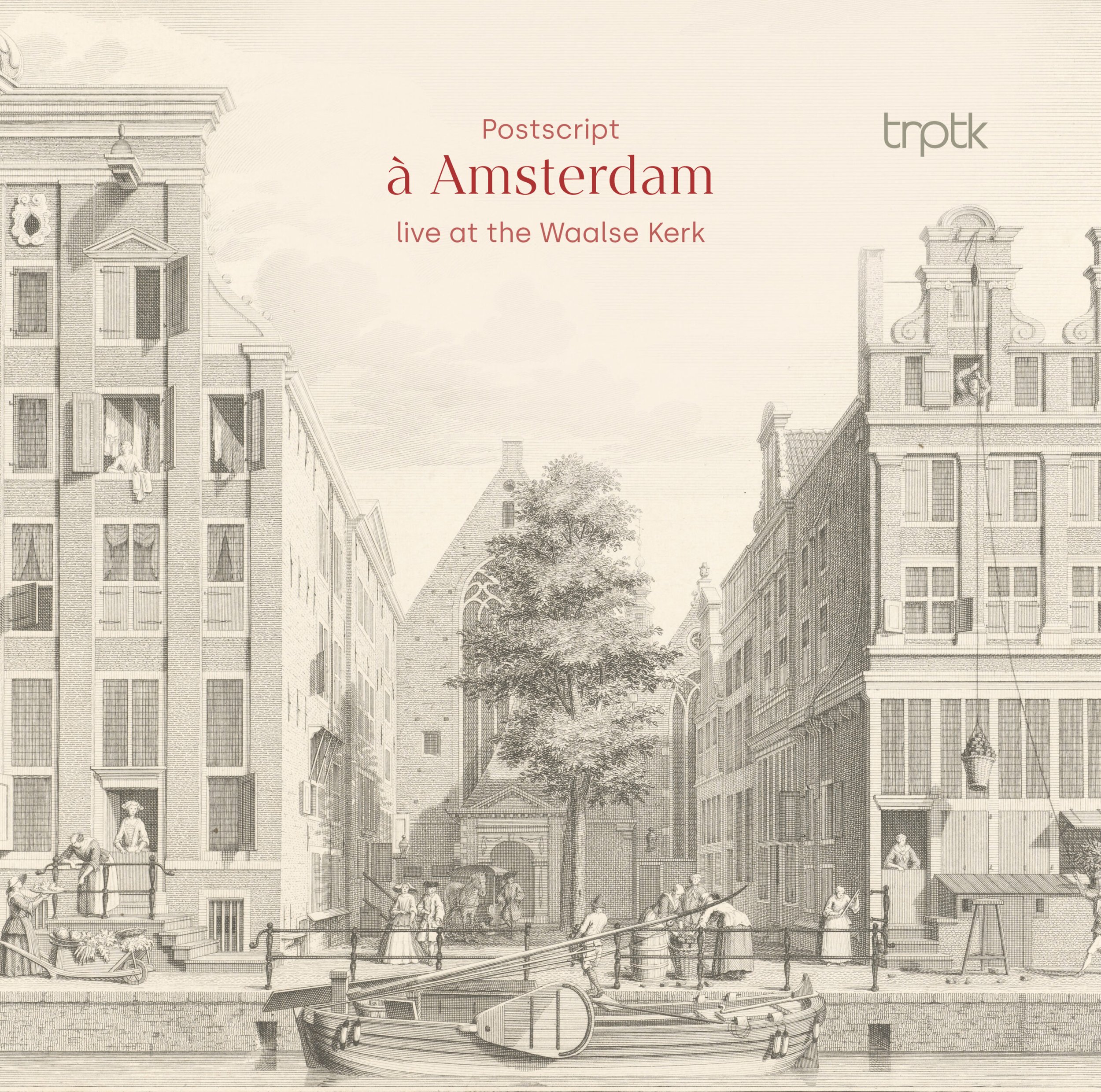
à Amsterdam featured on Concertzender radio station
Nieuwe cd’s met Oude Muziek. In deze eerste aflevering van 2024 aandacht voor de nieuwe cd’s ‘Postscript à Amsterdam’ en ‘The Queen’s Favourites’ van La Petite Écurie.
Op de eerste CD ‘Postscript à Amsterdam, live at the Waalse Kerk’ heeft het ensemble Postscript het idee uitgewerkt om een album geheel te wijden aan muziek uit het 17e en 18e-eeuwse Amsterdam.
Postscript is een jong ensemble gespecialiseerd in de historische uitvoering van muziek van Barok tot Romantiek. De vaste bezetting is Aysha Wills en David Westcombe, traverso. Octavie Dostaler-Lalande, cello en Artem Belogurov, clavecimbel.
De tweede CD ‘The Queen’s Favourite’ is gewijd aan muziek voor hobo-ensemble aan het hof van Mary Stuart. Uitvoerenden zijn leden van het ensemble La Petite Écurie.
Johann Christian Schickhardt (1682-1762)
1. Uit de bundel: ’12 sonates à une flute et une basse continue’, opus 23: Sonata IV
– Adagio
– Allemanda allegro
– Vivace
– Giga
– Gavotte Presto
Aysha Wills, traverso. Artem Belogurov, clavecimbel
Jacob Klein (1688-1748)
2. Uit de bundel: ‘VI sonata a violoncelle solo e basso continuo’, opus 4: Sonata 1
– Allegro
– Poco Adagio – Poco Allegro – Poco Adagio
– Allegro
Octavie Dostaler-Lalande, cello en Artem Belogurov, clavecimbel
Antoine Mahaut (1719-1785)
3. Uit de bundel: ‘Six Trio Sonatas voor twee fluiten en continuo’: Sonata VI
– Largo e cantabile
– Allegro
– Largo
– Presto
Postscript: Aysha Wills en David Westcombe, traverso. Octavie Dostaler-Lalande, cello en Artem Belogurov, clavecimbel
(CD Postscript à Amsterdam, live at the Waalse Kerk. TRPTK TTK 0097)
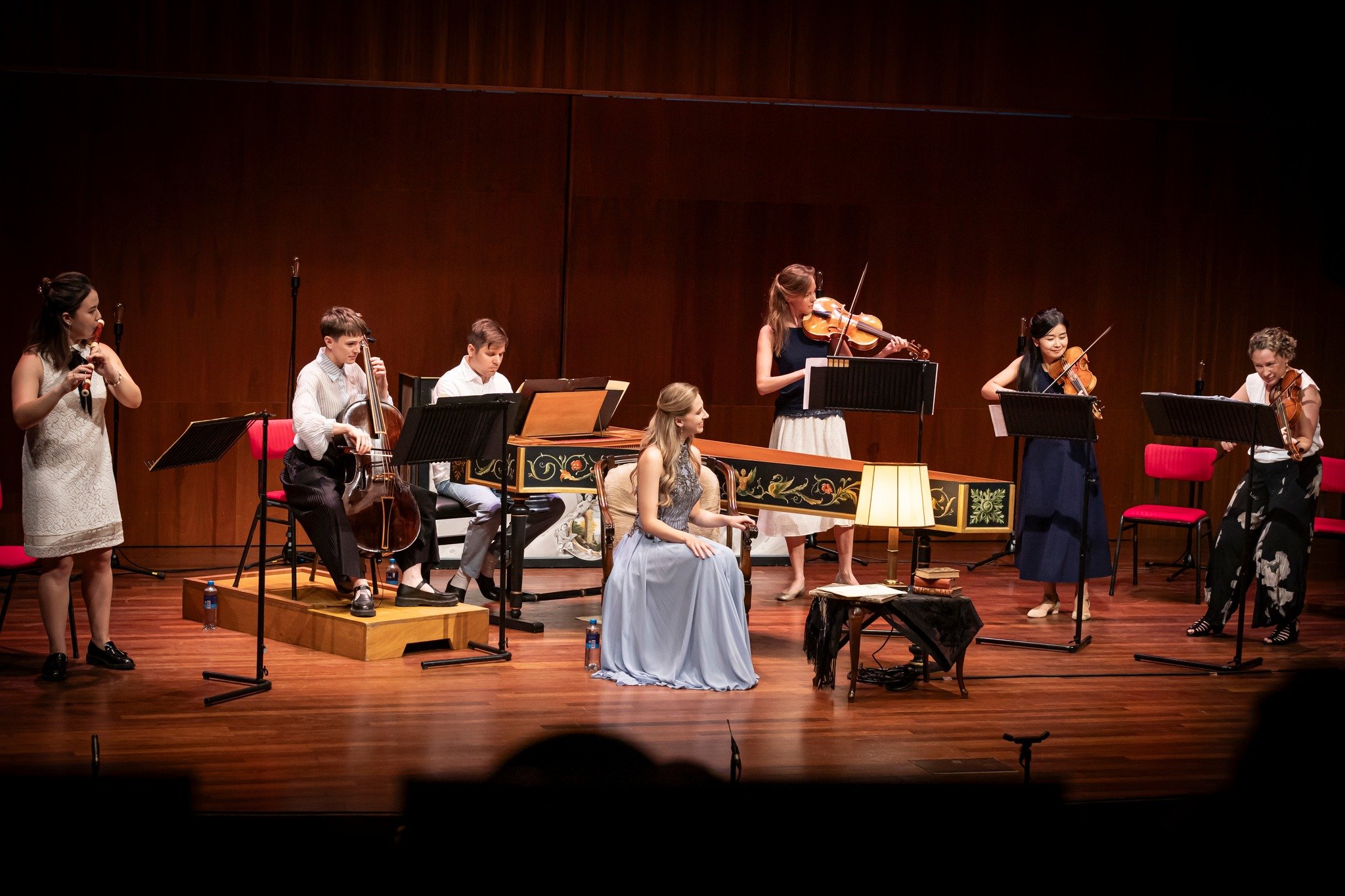
Sublimely Intimate: Opera Gala in the Salon
Sublimely Intimate: Opera in the Salon
Elisabeth Hetherington, soprano
Aysha Wills, traverso
Cynthia Freivogel & Tomoe Badiarova, violins
Iteke Wijbenga, viola
Octavie Dostaler-Lalonde, cello
Artem Belogurov, harpsichord
Elisabeth Hetherington's star is rising fast. For both early music and new music, she is a dream interpreter, with a radiant voice and an equally lucid imagination. This opera gala takes us back to the eighteenth-century noble salon, where visitors loved to listen to the hits from the opera theatre in domestic settings. Many popular opera arias from that era were brilliantly arranged for smaller ensemble. These are brought to life by Postscript, one of the best baroque ensembles in our country. A programme with arias by Handel, Hasse, Bononcini and other grandmasters.
https://www.classicalnow.nl/en/Concerten/Herfst-2023/SUBLIEM-INTIEM.html
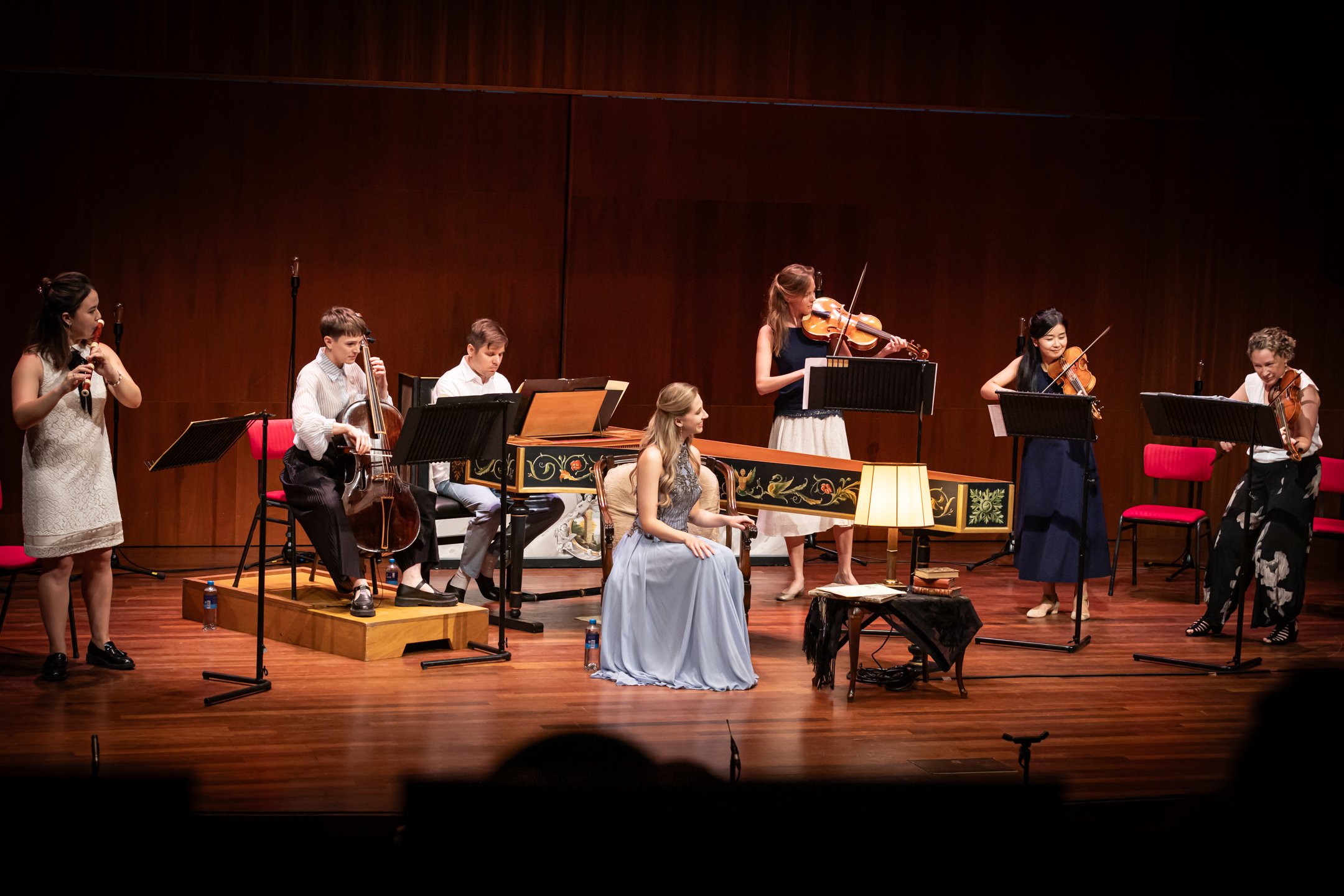
Opera at home
OVER DIT CONCERT
Zoals paradetoppers van nu werden ook hits van de achttiende-eeuwse operatheaters gepubliceerd in allerlei bewerkingen. Elke amateurmusicus vond wel zijn gading in het aanbod, van eenvoudig lied tot kunstig kleinood. Sopraan Elisabeth Hetherington voegt zich bij het ensemble Postscript voor een even subliem als intiem rondje applausaria’s van Johann Adolph Hasse, Georg Friedrich Händel en Giovanni Battista Bononcini.
MUSICI
Elisabeth Hetherington sopraan
Aysha Wills traverso
Cynthia Freivogel viool I
Tomoe Badiarova viool II
Iteke Wijbenga altviool
Octavie Dostaler-Lalonde cello
Artem Belogurov klavecimbel
PROGRAMMA
Johann Adolph Hasse 1699-1783
Sinfonia
(uit: Enea in Caonia)
Georg Friederich Händel 1685-1759
Barbara io ben lo so
(uit: Alcina)
Giovanni Battista Bononcini 1670-1747
Preludio instrumentaal
(uit: Siedi Amarilli mia)
Anoniem 17de eeuw
Amo il regno et amo il figlio
(uit: Elvira regnante)
Francesco Ballarotti 1660-1712
Stelle avverse in cielo armatevi
(uit: Ottaviano in Sicilia)
Georg Friederich Händel
Tornami a vagheggiar from
(uit: Alcina)
Menuetto instrumentaal (uit: Rodelinda)
Johann Adolph Hasse
L'Augelletto in Lacci Stretta
(uit: La Didone abbandonata)
Georg Friedrich Händel / arr. William Babell 1690-1723
Lascia ch'io pianga instrumentaal
Georg Friedrich Händel
Lascia ch'io pianga
(uit: Rinlando)
Francesco Geminiani 1687-1762
Know, Madame I never was born (‘A Favourite Minuet by Mr. Geminiani’) (uit: British Musical Miscellany, Londen 1733-34)
Georg Friedrich Händel
Love thou great ruler (‘A favourite air by Mr. Handel’)
Anoniem 18de eeuw
A Scotch song
(uit: British Musical Miscellany)
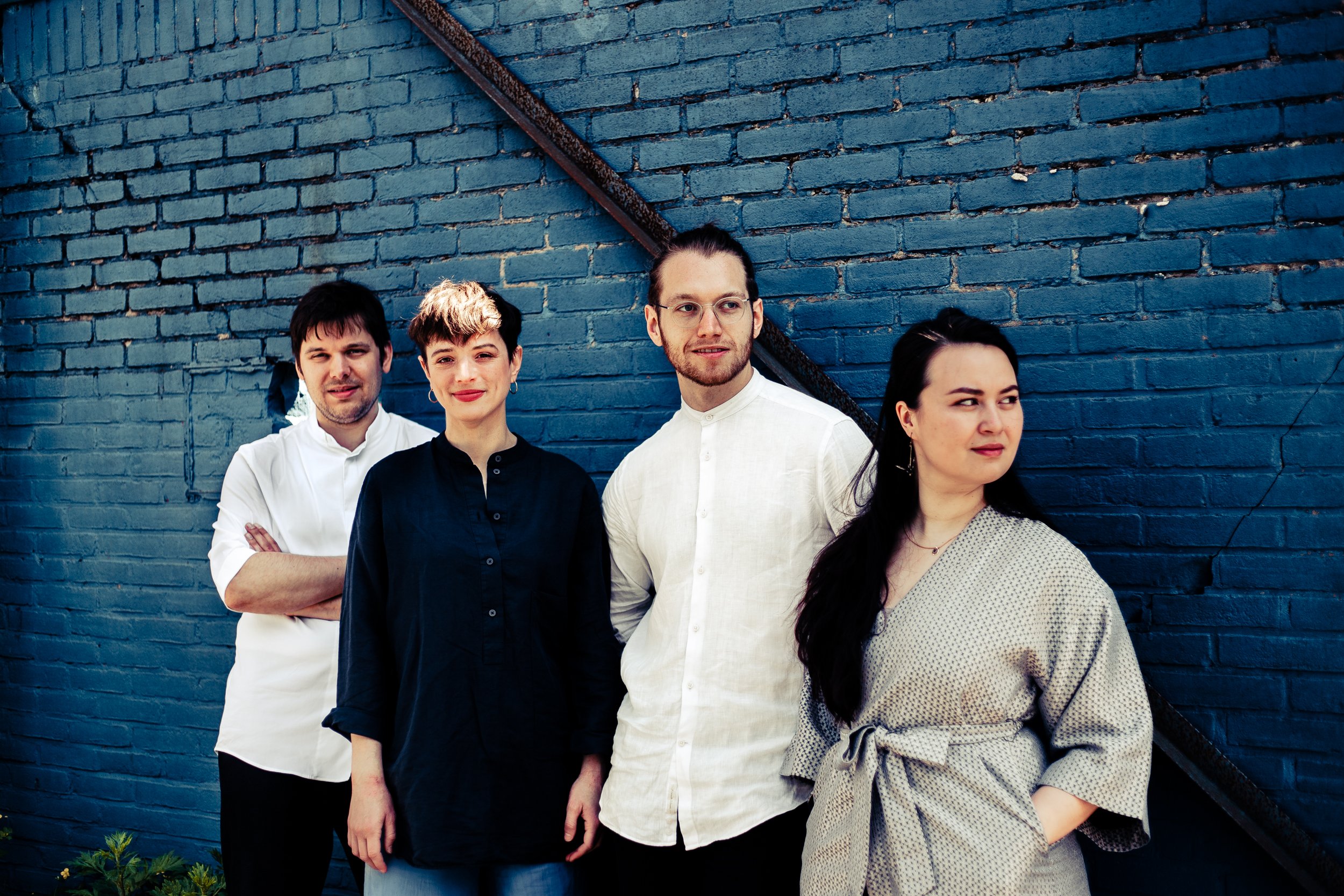
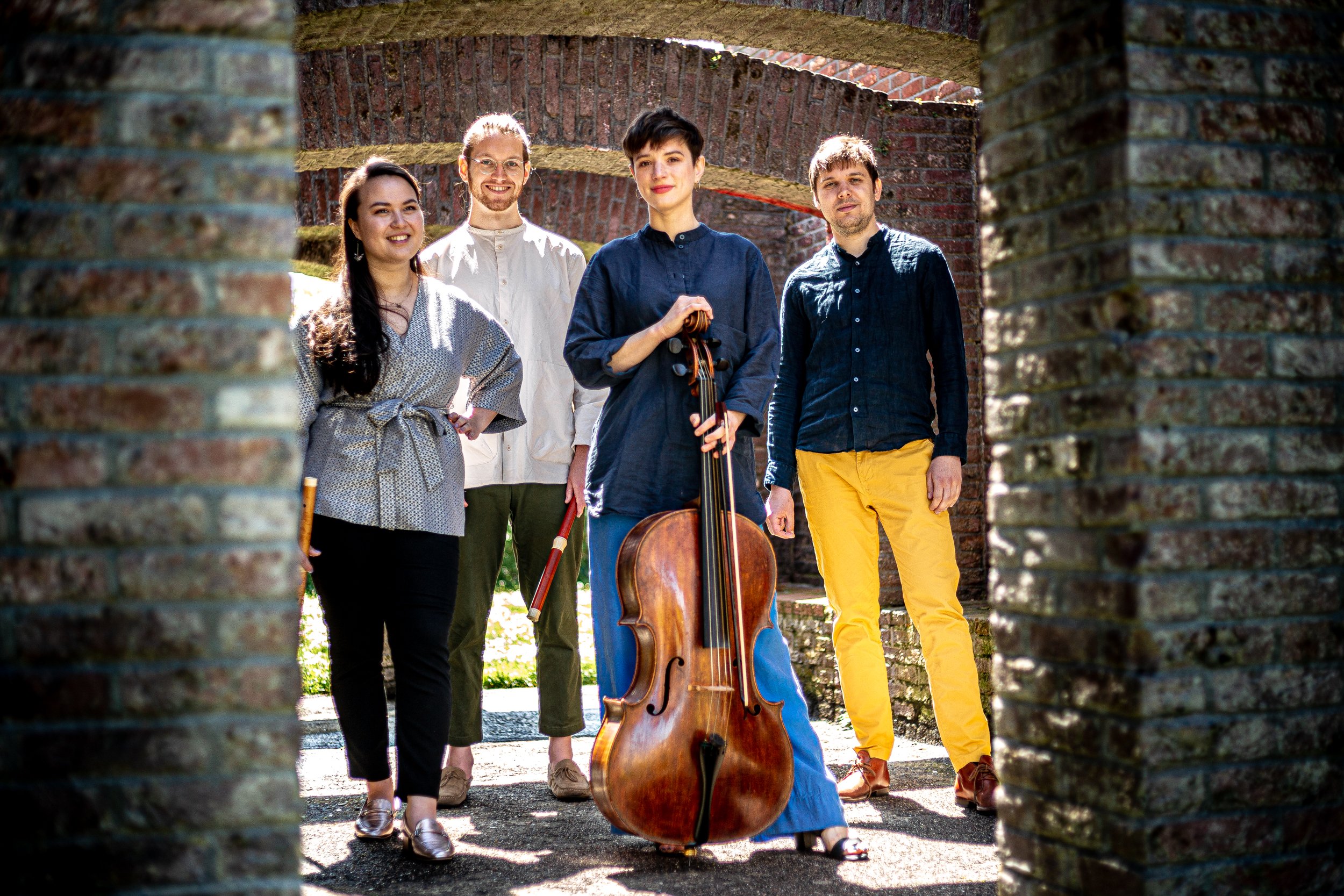
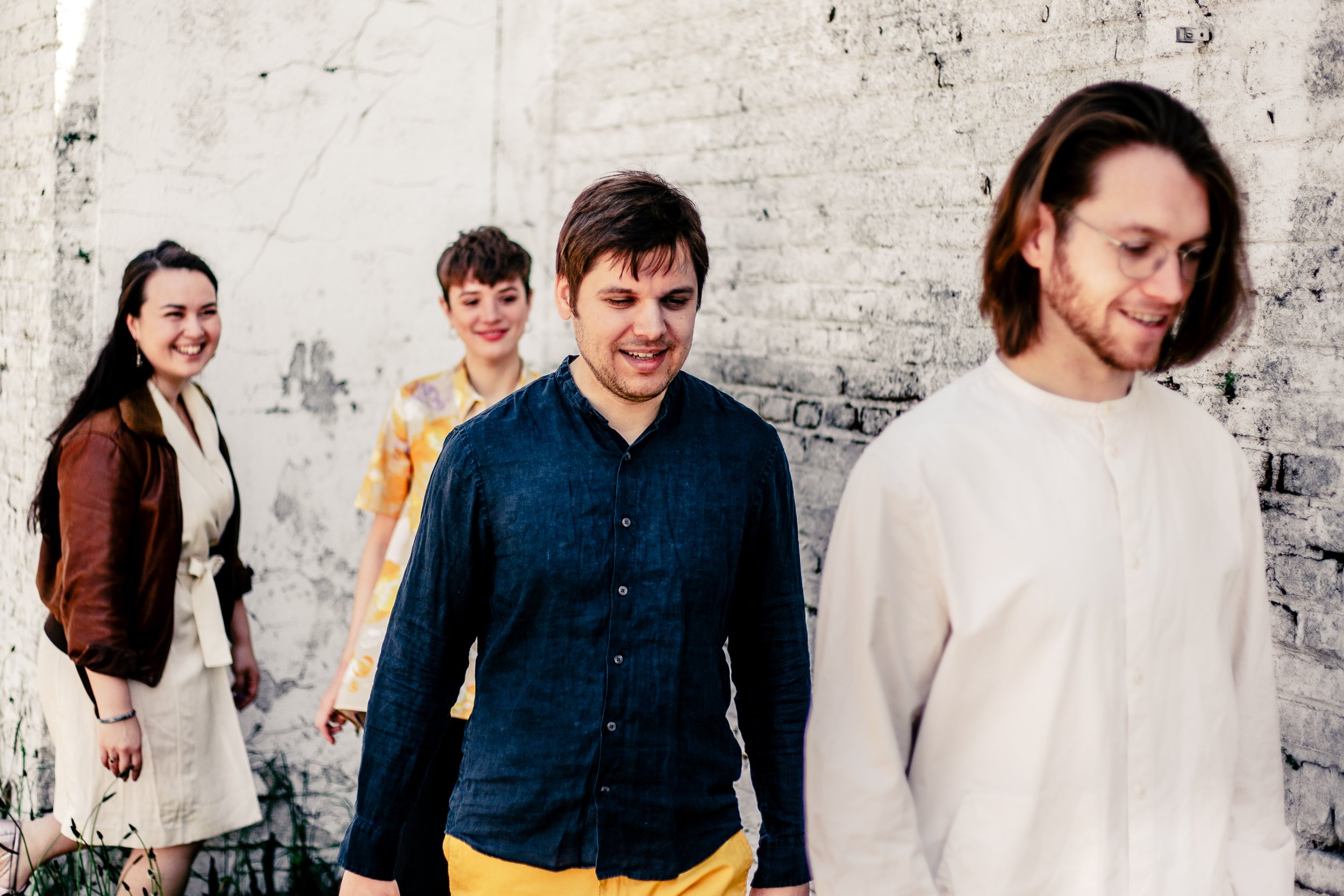
à Amsterdam
Music by JS Bach, Schickhardt, de Fesch, Locatelli, Mahaut, de Konink and van Noordt
David Westcombe, Aysha Wills - traverso
Octavie Dostaler-Lalonde - cello
Artem Belogurov - organ
The scene is a warmly-lit house on the Grachtengordel in 18th-century Amsterdam: remnants of a hearty dinner remain on the table, but the guests have repaired to the salon, where the musicians among them have taken up their instruments or seated themselves before the harpsichord. As the musicians begin to play, you notice that the music was printed neither in London nor Leipzig but right here in Amsterdam.
This programme celebrates Amsterdam and its role as one of the main music-publishing centres in 18th-century Europe. Building on its success in book publishing in the previous century, Amsterdam became fertile ground for music as well: at one point in the 18th century, there were no fewer than 76 houses publishing music! Of special importance ar the firms of E. Roger and his daughter in the first half of the century and J. J. Hummel and J. Schmitt in the second half.
The music on this programme comes from the catalogues of these publishing firms. Among the most famous of Roger’s hundreds of publications are Corelli’s Concerti Grossi op. 6 and Vivaldi’s Four Seasons. Hummel and Schmitt popularised the music of Haydn, Mozart, C.P.E. Bach, and scores of other galant and Classical composers of note, both in the Netherlands and in northern Europe.
We have selected a variety of chamber works published in Amsterdam — beautiful, intriguing, and well-crafted works by both composers living and working in Amsterdam and foreigners who found fame here through the publishing industry.
The Last Act @ OverActing Leiden
THE LAST ACT
An Evening of Music, Theatre and Film
ABOUT THE EVENT
Three performances of half an hour each in different spaces in the Stadsgehoorzaal, with the audience moving from hall to hall. The grand finale to OverActing 2022!
In the Breezaal, Jed Wentz performs Edgar Allan Poe’s gothic masterpiece The Raven, with a musical accompaniment by Olga Pashchenko on an historical piano. Wentz’s performance is inspired by the research he carried out in the archive of David Bispham, who famously performed The Raven as a melodrama in 1909. In English.
In the Aalmarktzaal, Martin de Ruiter (Eye Filmmuseum Amsterdam) will accompany the 1920 silent film De Dood van Pierrot, a dramatic comedy about actors, acting and film-making. This film underscores the main themes of our OverActing festival by showcasing three different acting styles: the naturalism of drama, the exaggerated naturalism of comedy, and the unnaturalistic, expressive and dancelike qualities of tragedy. De Dood van Pierrot is not only charming in its own right, but invites us to reflect on the central position of naturalism in our current acting styles. Dutch intertitles and English subtitles.
Postscript finishes the evening in the Aalmarkzaal with a semi-scenic performance of a comic French Baroque cantata by composer Jean-Baptiste Stuck, Héraclite et Démocrite.These two Greek philosophers inform us that the world is a sad disaster and advise us how to cope: according to Heraclitus we can only weep, but Democritus simply cannot stop laughing at us, at himself, at everything. Two historical singer-actors, Michal Bitan and João Luís Paixão, take us back to the Paris of the 1710s, and help us to look out on our own sad world with tears of laughter in our eyes. In French.
Postscript:
Tomoe Badiarova & Emma Williams, violins
Octavie Dostaler-Lalonde, cello
Artem Belogurov, harpsichord
Featuring:
Michal Bitan, soprano-actress
João Luís Paixão, baritone-actor
This event is part of the Theaterfestival OverActing in Leiden, which explores the power of the theatrical traditions of the past, from tragic Greek mythology to comic silent films.

Theater Evening @ OverActing Leiden
Theater Evening: A Historically informed Extravaganza
ABOUT THE EVENT
The excitement of an historical evening in the theatre, set in the oldest theatre of the country. Our Saturday gala event in the Leidse Schouwburg will have no intermission, the lights will stay on in the auditorium, and the audience will come and go as they please. Three short one-act play – a drama, a tragedy and a comedy – will be performed with live music, singing and dancing. With 100-year-old theatrical decors from the Vanderberghe collection on stage, historically inspired costumes, and actors using historical gesture and declamation techniques, this will be a night to remember! The music will be performed by the young early music ensemble Postscript.
Texts in German, English, French and Dutch.
Pygmalion is a melodrama about an artist so love with his own creation that his obsession drives him close to madness His beautiful statue of Galatea is cold marble, …or does he see her breathing, can she come to life? With text by Jean-Jacques Rousseau, the version that actor João Luís Paixão and dancer Irène Feste will perform is in German, set to music by the Czech composer Jiri Benda.
Proserpina is a dark and powerfully tragic one-woman show, with a text by Johann Wolfgang von Goethe and music by Carl Eberwein. It paints the desperate situation of the young and innocent Proserpina, who was abducted and forced into marriage with Pluto, the God of Hades. Unlike the Greek myth, where Proserpina is allowed to return to the light for half the year as Goddess of Spring, Goethe’s heroine finds no escape from the horrors of the hell to which she is condemned.
The farcical comedy De Bruiloft van Kloris en Roosje (Kloris and Roosje’s Wedding)used to be enormously popular in the Netherlands. It was performed non-stop from the early 18th century into the 1970s. Although it is usually associated with Amsterdam, it was written by Jacob van Rijndorp, the founder of the Leidse Schouwburg, so that in reviving the piece we are also bringing it back home. The innovative performers of Theater Kwast will tear down the fourth wall and draw the audience into the show, reviving lost traditions and leading the evening to a joyous conclusion.
Postscript is:
Tomoe Badiarova & Emma Williams, violins
Aysha Wills, flute
Iteke Wijbenga, viola
Octavie Dostaler-Lalonde, cello
Jesse Solway, double bass
Artem Belogurov, fortepiano
Featuring:
Elisabeth Hetherington, soprano
João Luís Paixão, actor
Laila Cathleen Neuman, actress
Irène Feste, dancer
Theater Kwast
This event is part of the Theaterfestival OverActing in Leiden, which explores the power of the theatrical traditions of the past, from tragic Greek mythology to comic silent films.
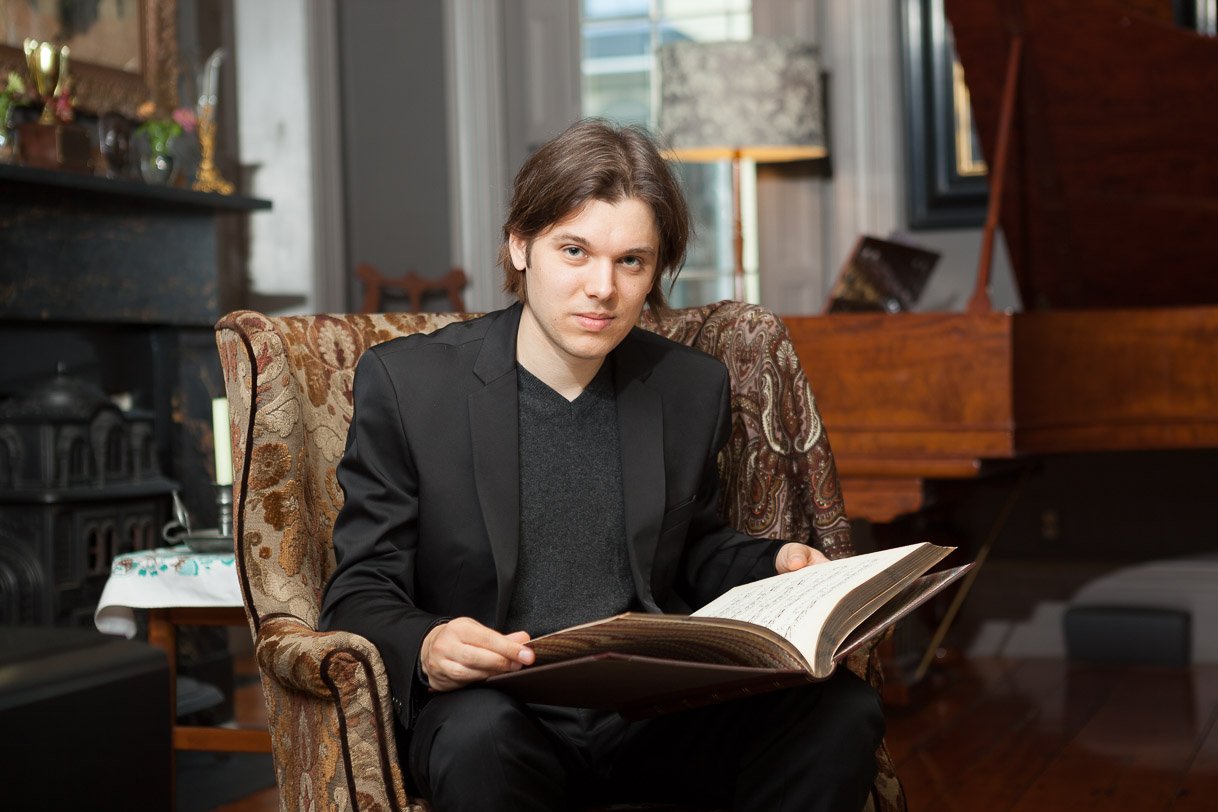
Mozartiade
Programma
Mozart - Pianoconcert No. 9 in Es, KV 271
Mozart - Pianoconcert No. 13 in C, KV 415/387b
Mozart - Sonata in G, KV 379
Postscript o.l.v. Artem Belogurov
Artem Belogurov, Stein fortepiano
Rachael Beesley, concertmeester en solist in KV 379
Beschrijving
Vader Leopold hield z'n hart vast: hoe moest het nou met Wolfgang als hij niet meer voor hem kon zorgen en stopte met naar hem luisteren? Maar Mozart was 25, wilde zelfstandig zijn, trouwen en zijn eigen muzikale weg volgen; hij was geen kind meer maar een jonge man. Dus schreef hij zijn laatste pianoconcert in Salzburg, Jeunehomme, en stapte in de diligence naar Wenen.
In augustus 1782 trouwde hij Constanze en hij componeerde; een van de eerste in Wenen geschreven pianoconcerten was KV 415. Verder was het wennen. Hij moest publiek werven voor zijn muziek, en begon daarom met inschrijvingsconcerten: bij voldoende belangstelling vooraf ging het concert door. En hoe meer publiek er in de zaal zat, hoe beter het financieel uitpakte. In grote zalen gebruikte hij dus grotere bezettingen en instrumenten die goed te horen waren.
Mozarts eerste fortepiano kocht hij bij de Weense bouwer Stein. Die bouwde niet alleen instrumenten waarvan de hamertjes met leer bekleed waren (zoals de meeste moderne fortepiano's) maar ook piano's met houten hamers. De dynamische mogelijkheden en het spectrum van klankkleuren daarvan waren veel breder dan we van de huidige historische kopieën gewend zijn. Ze zijn relatief luid en doen soms denken aan een Hongaarse cimbalom.
Mozart heeft zeker beide soorten fortepiano's gekend. Aannemelijk is het dat hij in zalen met veel publiek de voorkeur gaf aan instrumenten met houten hamers. Dat willen we wel eens horen! En daarom klinkt in deze Mozartiade een heel nieuwe, authentieke interpretatie van werken uit deze periode. In combinatie met verschillende instrumentaties bespeelt fortepianist Artem Belogurov een speciale kopie van een instrument van Mozarts pianobouwer Stein. De fortepiano is gebouwd door Gerard Tuinman voor het Nationaal Muziekinstrumenten Fonds.
This concert is part of the concert series Musica Antica da Camera in The Hague.
https://www.amare.nl/nl/agenda/1065/Musica_Antica_de_Camera/Mozartiade
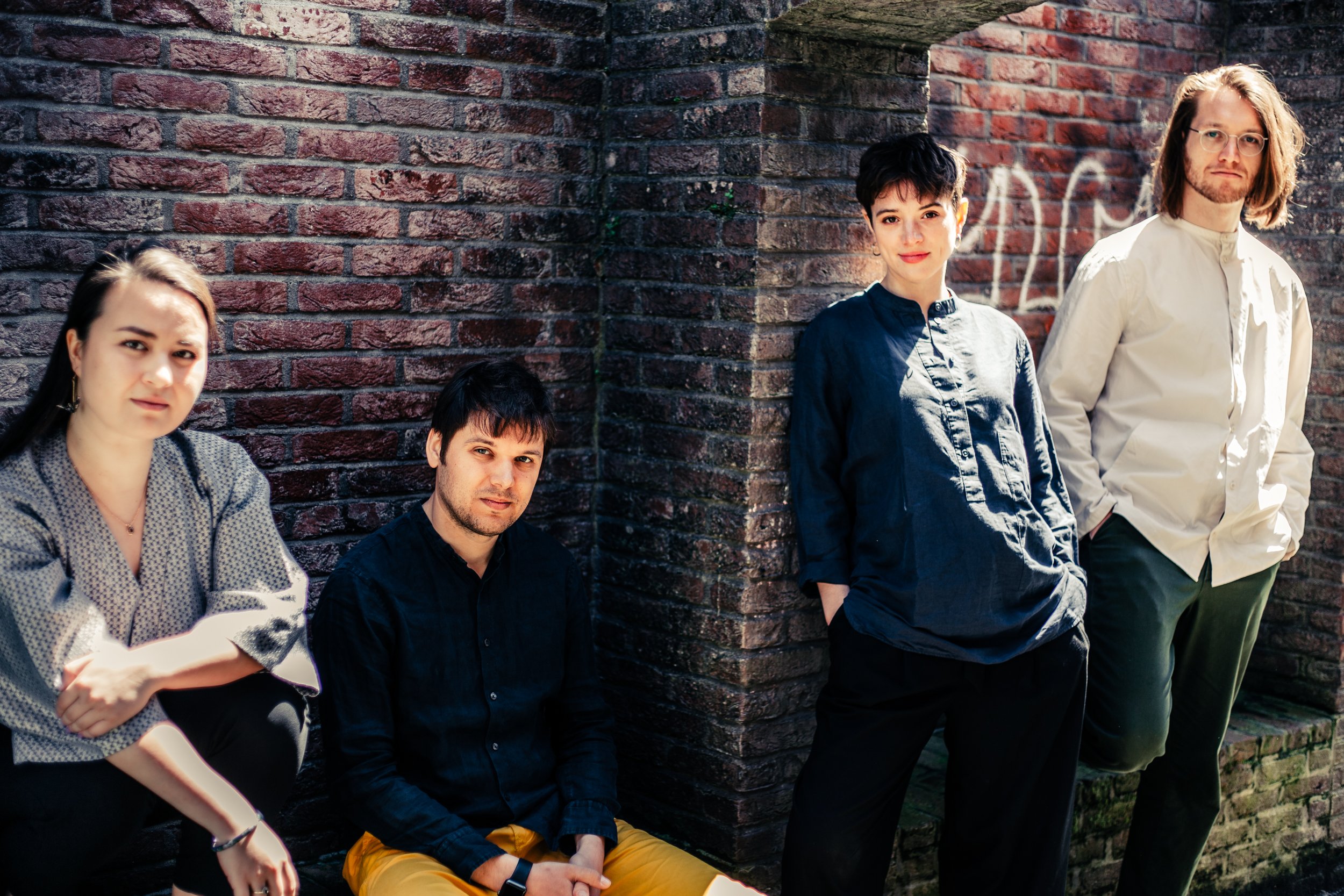
Music from 18th-century Amsterdam
Music by Schickhardt, de Fesch, Locatelli, Mahaut, Klein, de Konink and van Noordt
David Westcombe, Aysha Wills - traverso
Octavie Dostaler-Lalonde - cello
Artem Belogurov - harpsichord
The scene is a warmly-lit house on the Grachtengordel in 18th-century Amsterdam: remnants of a hearty dinner remain on the table, but the guests have repaired to the salon, where the musicians among them have taken up their instruments or seated themselves before the harpsichord. As the musicians begin to play, you notice that the music was printed neither in London nor Leipzig but right here in Amsterdam.
This programme celebrates Amsterdam and its role as one of the main music-publishing centres in 18th-century Europe. Building on its success in book publishing in the previous century, Amsterdam became fertile ground for music as well: at one point in the 18th century, there were no fewer than 76 houses publishing music! Of special importance ar the firms of E. Roger and his daughter in the first half of the century and J. J. Hummel and J. Schmitt in the second half.
The music on this programme comes from the catalogues of these publishing firms. Among the most famous of Roger’s hundreds of publications are Corelli’s Concerti Grossi op. 6 and Vivaldi’s Four Seasons. Hummel and Schmitt popularised the music of Haydn, Mozart, C.P.E. Bach, and scores of other galant and Classical composers of note, both in the Netherlands and in northern Europe.
We have selected a variety of chamber works published in Amsterdam — beautiful, intriguing, and well-crafted works by both composers living and working in Amsterdam and foreigners who found fame here through the publishing industry.
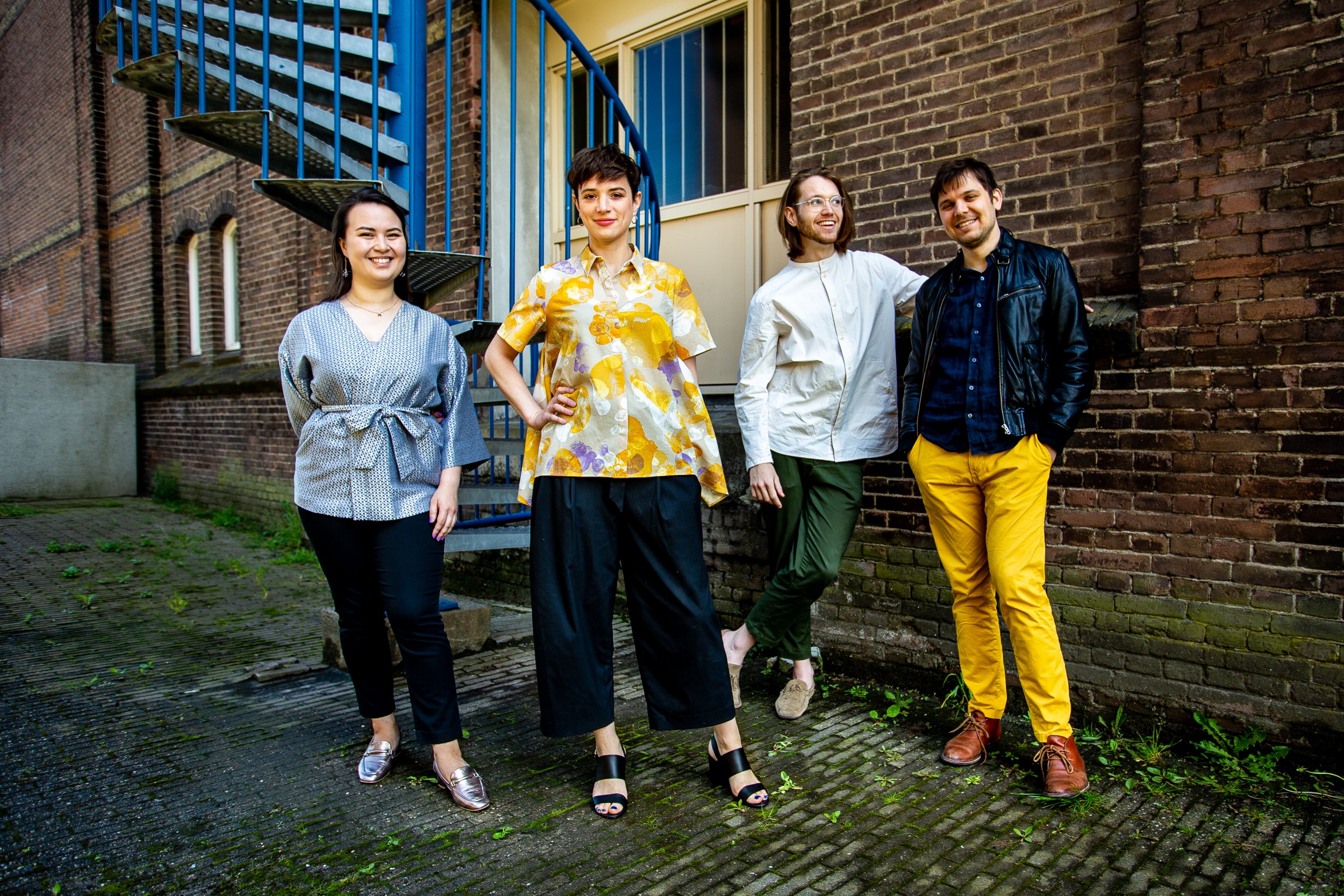
Music from 18th-century Amsterdam
Music by Schickhardt, de Fesch, Locatelli, Mahaut, Klein, de Konink and van Noordt
David Westcombe, Aysha Wills - traverso
Octavie Dostaler-Lalonde - cello
Artem Belogurov - harpsichord
The scene is a warmly-lit house on the Grachtengordel in 18th-century Amsterdam: remnants of a hearty dinner remain on the table, but the guests have repaired to the salon, where the musicians among them have taken up their instruments or seated themselves before the harpsichord. As the musicians begin to play, you notice that the music was printed neither in London nor Leipzig but right here in Amsterdam.
This programme celebrates Amsterdam and its role as one of the main music-publishing centres in 18th-century Europe. Building on its success in book publishing in the previous century, Amsterdam became fertile ground for music as well: at one point in the 18th century, there were no fewer than 76 houses publishing music! Of special importance ar the firms of E. Roger and his daughter in the first half of the century and J. J. Hummel and J. Schmitt in the second half.
The music on this programme comes from the catalogues of these publishing firms. Among the most famous of Roger’s hundreds of publications are Corelli’s Concerti Grossi op. 6 and Vivaldi’s Four Seasons. Hummel and Schmitt popularised the music of Haydn, Mozart, C.P.E. Bach, and scores of other galant and Classical composers of note, both in the Netherlands and in northern Europe.
We have selected a variety of chamber works published in Amsterdam — beautiful, intriguing, and well-crafted works by both composers living and working in Amsterdam and foreigners who found fame here through the publishing industry.
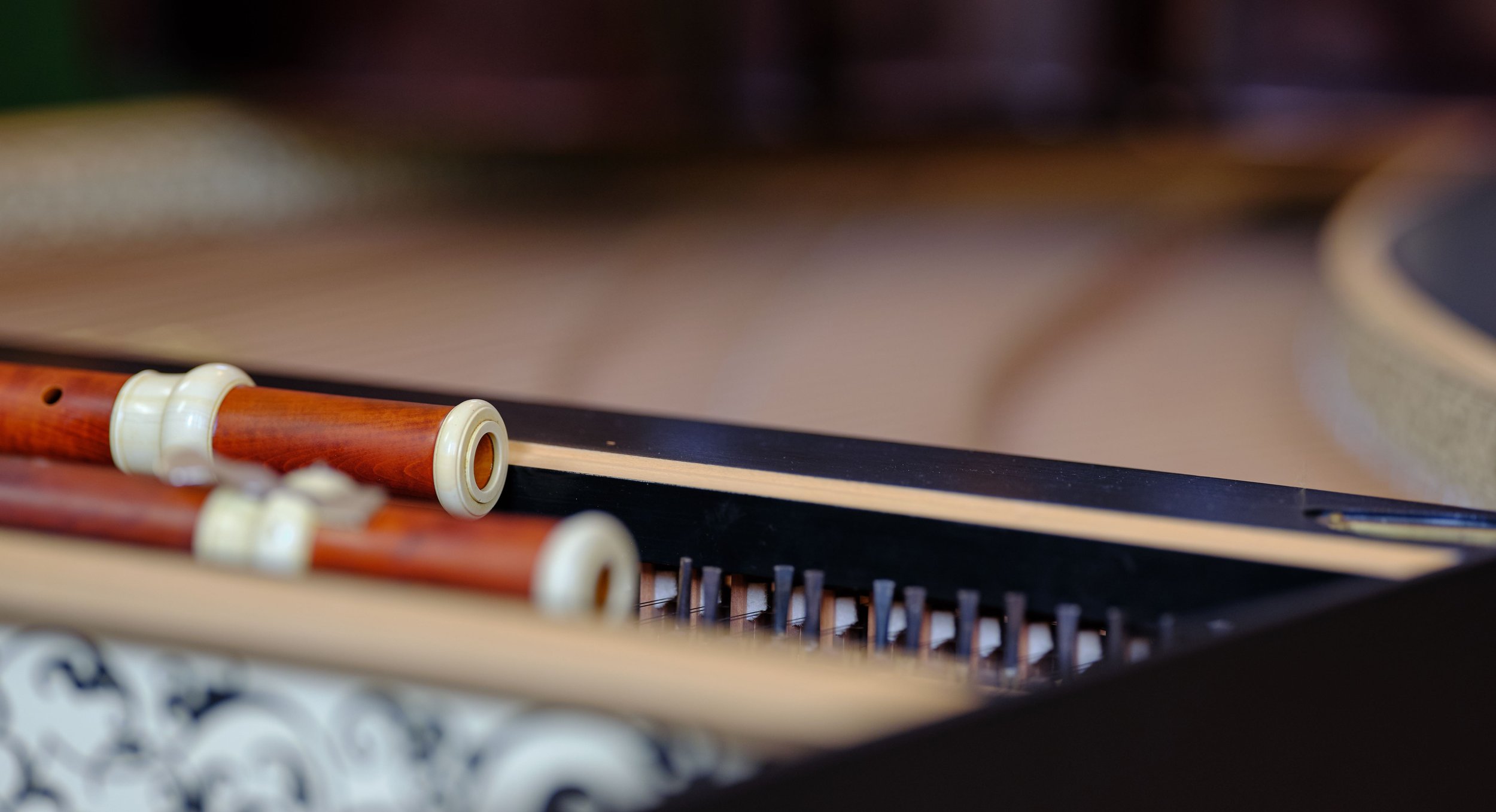
Koželuch, Hummel & Dussek - MA Festival Brugge
In this program, Postscript takes the form of a flute & piano trio to explore the birth of Romanticism in music, through rarely heard works by Kozeluch, Hummel and Dussek.
Aysha Wills, flute
Artem Belogurov, 1823 Graf pianoforte, collection Chris Maene
Octavie Dostaler-Lalonde, cello by Thomas Dodd 1800
Kozeluch, Trio for flute, cello and piano in E minor Op.40 P IX:33 (16 min)
Hummel, Adagio, Variations and Rondo on a Russian Theme Op.78 - 1818 (17 min)
Dussek, Sonata for Flute, Cello and Piano Op.35 (25 min)
Wat hebben Koželuch, Hummel en Dussek met elkaar gemeen? Ze delen de liefde voor de piano, werden in hun eigen tijd geroemd én flirten met de grens tussen klassiek en vroeg-romantiek. Jammer genoeg staan ze vandaag ook eerder in de schaduw. Onbekend is onbemind en dus besloten de jonge musici van ensemble Postscript daar verandering in te brengen.
Met dit charmante en lyrische programma halen ze het vroeg-romantische repertoire van deze drie musici vanonder het stof en onttrekken het zo aan de vergetelheid. Ensemble Postscript is nog een nobele onbekende in Brugge, maar met dit bekoorlijke programma weten ze zich ongetwijfeld in je oren te nestelen! Om nooit meer te vergeten!
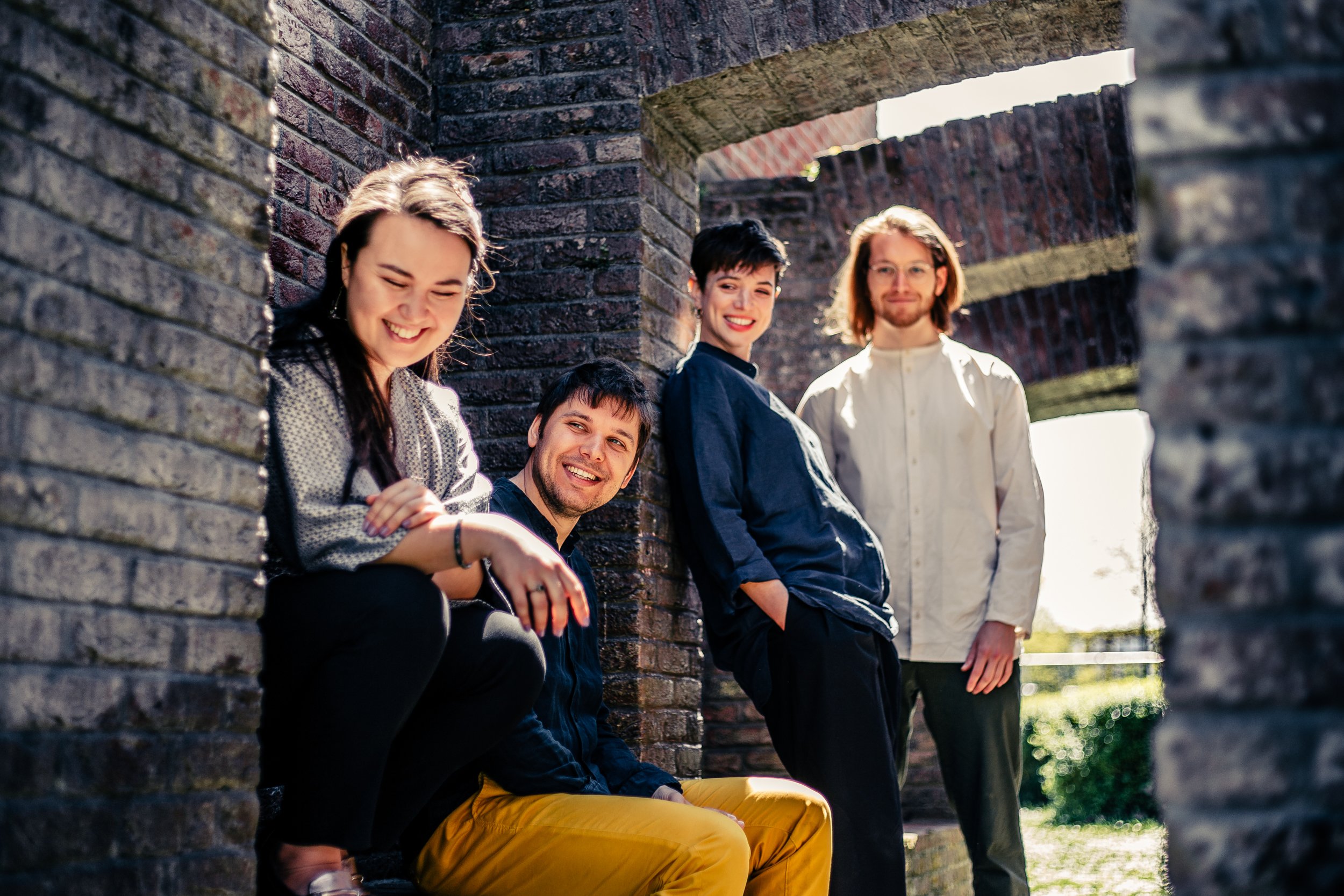
TRPTK Live - Amsterdam CD
This event is a live CD recording of our Amsterdam program. Audience members are welcome, to fuel our performative energy!
Music by Schickhardt, de Fesch, Locatelli, Mahaut, Klein, de Konink and van Noordt
David Westcombe, Aysha Wills - traverso
Octavie Dostaler-Lalonde - cello
Artem Belogurov - harpsichord
The scene is a warmly-lit house on the Grachtengordel in 18th-century Amsterdam: remnants of a hearty dinner remain on the table, but the guests have repaired to the salon, where the musicians among them have taken up their instruments or seated themselves before the harpsichord. As the musicians begin to play, you notice that the music was printed neither in London nor Leipzig but right here in Amsterdam.
This programme celebrates Amsterdam and its role as one of the main music-publishing centres in 18th-century Europe. Building on its success in book publishing in the previous century, Amsterdam became fertile ground for music as well: at one point in the 18th century, there were no fewer than 76 houses publishing music! Of special importance ar the firms of E. Roger and his daughter in the first half of the century and J. J. Hummel and J. Schmitt in the second half.
The music on this programme comes from the catalogues of these publishing firms. Among the most famous of Roger’s hundreds of publications are Corelli’s Concerti Grossi op. 6 and Vivaldi’s Four Seasons. Hummel and Schmitt popularised the music of Haydn, Mozart, C.P.E. Bach, and scores of other galant and Classical composers of note, both in the Netherlands and in northern Europe.
We have selected a variety of chamber works published in Amsterdam — beautiful, intriguing, and well-crafted works by both composers living and working in Amsterdam and foreigners who found fame here through the publishing industry.
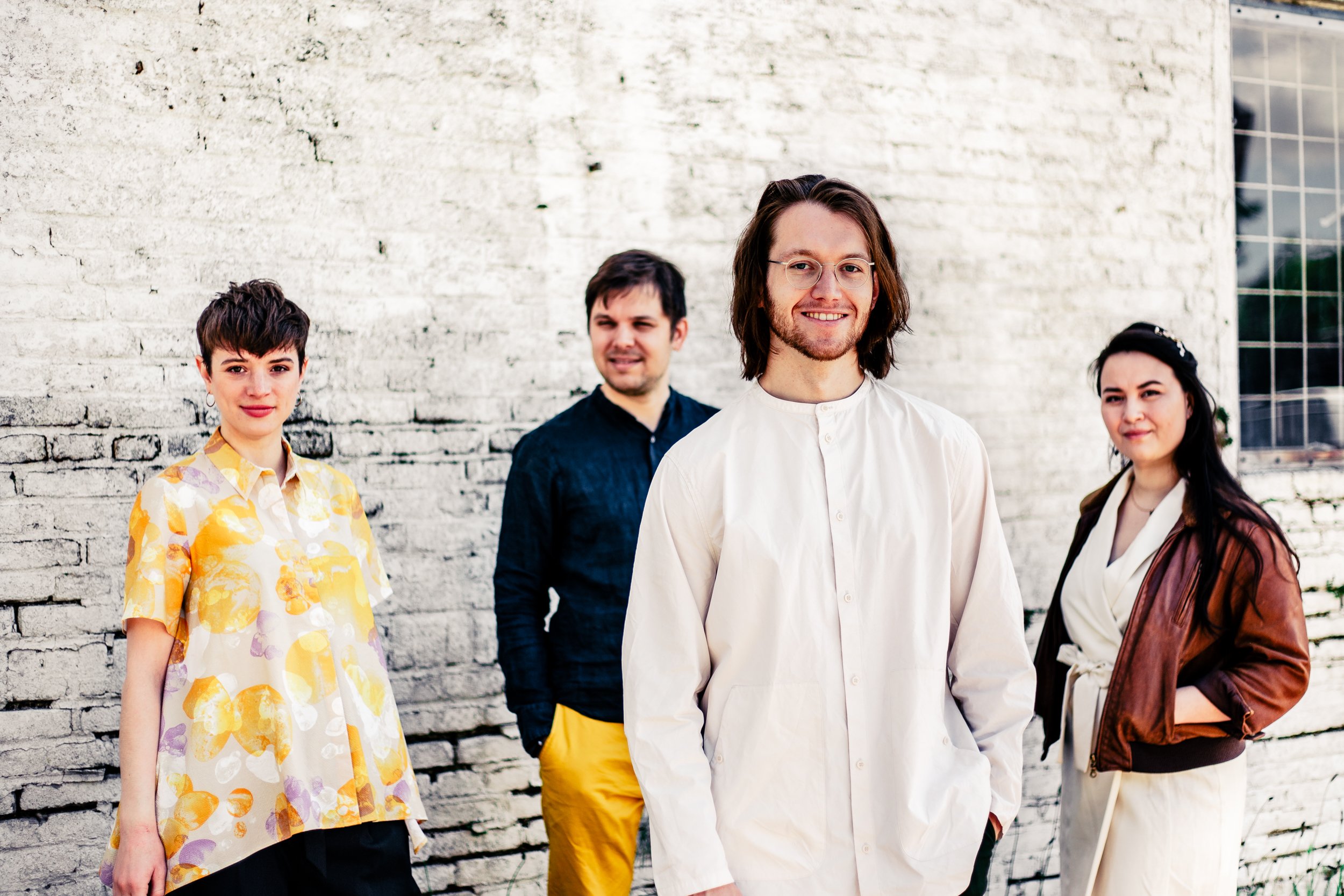
NPO Radio4
Tune in to NPO Radio4 to hear excerpts from our upcoming Live CD recording, all music from 18th century Amsterdam!

Music from 18th-century Amsterdam
Music by Schickhardt, de Fesch, Locatelli, Mahaut, Klein, de Konink and van Noordt
David Westcombe, Aysha Wills - traverso
Octavie Dostaler-Lalonde - cello
Artem Belogurov - harpsichord
The scene is a warmly-lit house on the Grachtengordel in 18th-century Amsterdam: remnants of a hearty dinner remain on the table, but the guests have repaired to the salon, where the musicians among them have taken up their instruments or seated themselves before the harpsichord. As the musicians begin to play, you notice that the music was printed neither in London nor Leipzig but right here in Amsterdam.
This programme celebrates Amsterdam and its role as one of the main music-publishing centres in 18th-century Europe. Building on its success in book publishing in the previous century, Amsterdam became fertile ground for music as well: at one point in the 18th century, there were no fewer than 76 houses publishing music! Of special importance ar the firms of E. Roger and his daughter in the first half of the century and J. J. Hummel and J. Schmitt in the second half.
The music on this programme comes from the catalogues of these publishing firms. Among the most famous of Roger’s hundreds of publications are Corelli’s Concerti Grossi op. 6 and Vivaldi’s Four Seasons. Hummel and Schmitt popularised the music of Haydn, Mozart, C.P.E. Bach, and scores of other galant and Classical composers of note, both in the Netherlands and in northern Europe.
We have selected a variety of chamber works published in Amsterdam — beautiful, intriguing, and well-crafted works by both composers living and working in Amsterdam and foreigners who found fame here through the publishing industry.